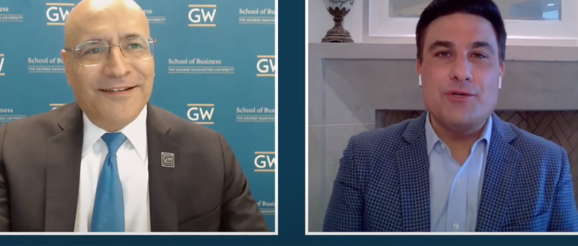Rubicon CEO Talks Innovation During Financial Crises

Rubicon CEO and GW alumnus Nate Morris shared keys to entrepreneurial success that he learned from the 2008 recession during a George Talks Business virtual event.

By Briahnna Brown
We are living in the best time “in the history of the world” to start a new venture, said Nate Morris, B.A. ’03, who founded waste management software company Rubicon amid the 2008 recession.
This is because it is the most cost-effective time to build technology from anywhere in the country, Mr. Morris said, and even in the midst of uncertain times such as the COVID-19 pandemic, great things can happen when you are willing to make them happen.
“We got started when most people were running for cover, and oftentimes I tell people that’s the time to get started—when everyone else is hunkering down and not wanting to take risks, that’s the time to take big risks,” Mr. Morris said. “I know we’re living during a pandemic right now, and I think now is the time to be bold, to take action, and the market, I believe, will reward that action.
“We need thought leaders,” he said. “We need people with big ideas to step up and to reinvigorate the economy and to get things moving again.”
Mr. Morris shared his insights Wednesday afternoon during a virtual George Talks Business event. The event series, which the George Washington University School of Business hosts and live-streams, features regularly-scheduled interviews with respected thought leaders in multiple fields. GWSB Dean Anuj Mehrotra interviewed Mr. Morris about the way Rubicon innovated technology for the waste management industry.
Waste management is the toughest industry to get into, Mr. Morris said, and many of his experiences running Rubicon were reminiscent of the HBO series “The Sopranos,” which showcased some of the ways the waste industry worked. As the host software for a network of independent waste haulers, he said, the work they do at Rubicon is not influenced by profits in the garbage sector over the recycling sector. This gives them the freedom to make recycling more cost effective and helps them push initiatives toward a zero-waste world, Mr. Morris said.
Thanks to the environmental, social and corporate governance (ESG) movement, the market is rewarding companies that can make social change through their business plan, Mr. Morris said, which is why he believes that Rubicon’s mission of eliminating waste, recycling more and not adding to landfills allows it to be so appealing to its consumers and create value for its investors.
As more entrepreneurs are seeking to make a social impact through their business ventures, Mr. Morris said that no one is ever too young or too inexperienced to get started on a great idea. Those looking to be successful at a start-up venture need to bring a lot of energy to the table, he said, and they should often show up early and go above and beyond. In Rubicon’s early days, Mr. Morris said, he was always looking people who were willing to do anything for the company to get it off the ground.
“It’s an attitude that, ‘I’m willing to do whatever it takes to make this company successful and make the sacrifices,’” Mr. Morris said. “There’s nothing glamorous about the entrepreneurial life: It’s long hours, it’s very low pay in the beginning, but when you see the vision start becoming active, and you see the change that you make…those are the things that really make it all worth it, that make all the sacrifice worth it.”
